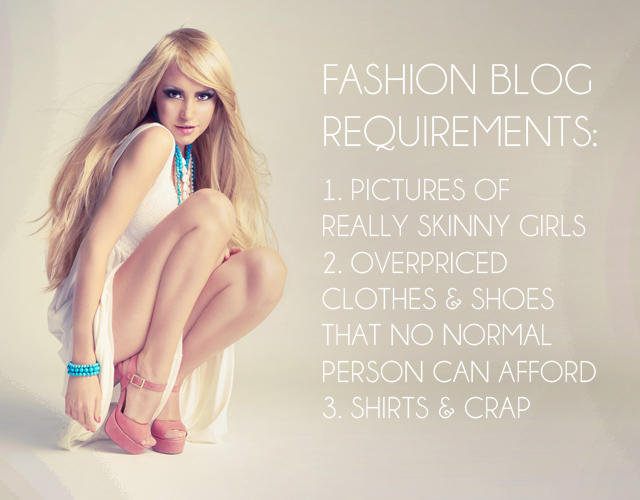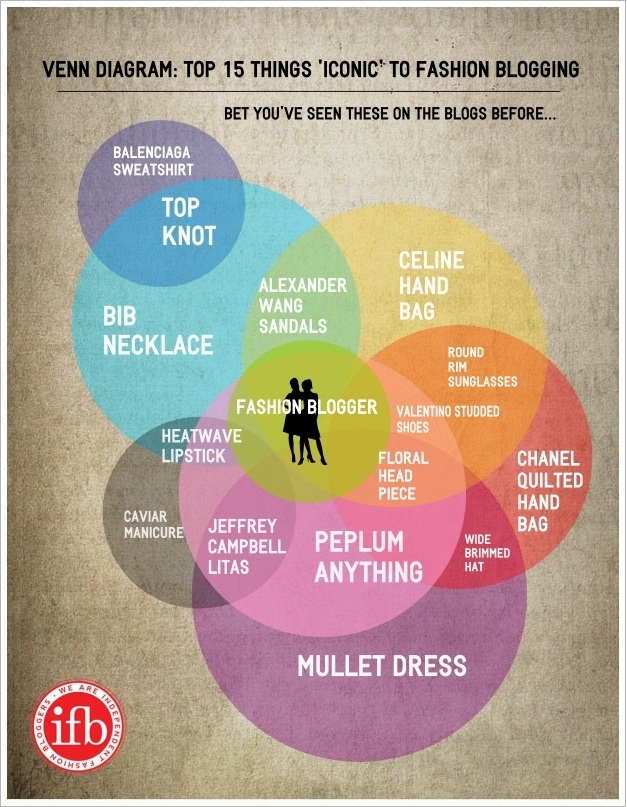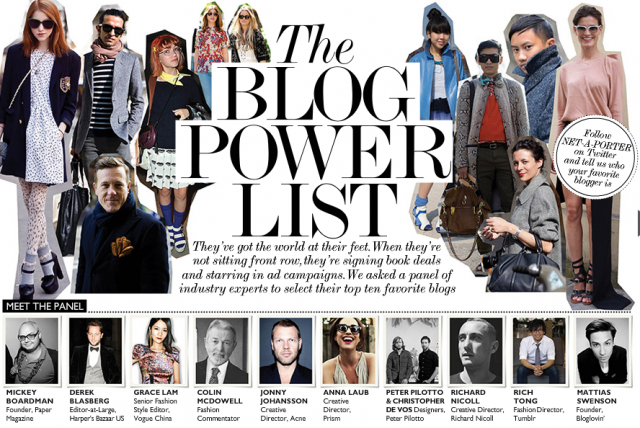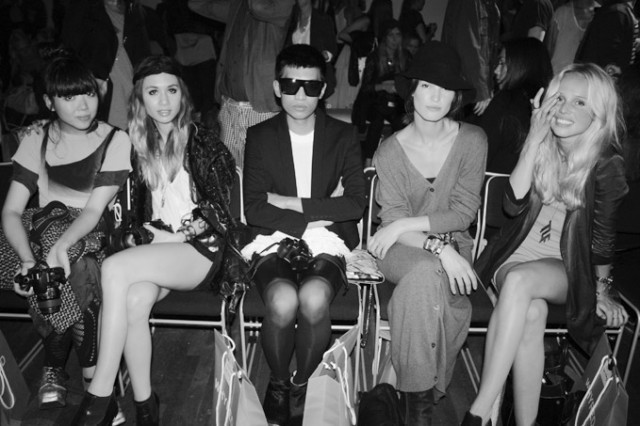Why Are There So Many Bad Fashion Blogs
Last month marked iv years since I started my first fashion blog. Back and so, bloggers were gaining tremendous popularity considering of their fun, accessible style and uncensored opinion, a cherished antidote to aspirational fashion magazines readers no longer related to. But what glitters is not always gold. Have bloggers democratised fashion for the long run or are they too guilty of dipping into the industry's less kosher sides?

Photo by Darling Stewie
Fashion blogging beginnings: Individuality and naivety
In the past, the fashion industry was proverbially hard to interruption into unless you were well-connected or rich. Along with early manner blogs emerged the idea of the 'democratisation of fashion', which was supposed to shake fashion bureaucracy to the core.
In regards to bloggers, 'democratisation of manner' meant that if you had a cool, relatively high-traffic web log and groovy style that didn't necessarily take to be all Chanel and Balenciaga, you could become part of the fashion industry without connections or instruction.
Fashion lovers were encouraged by the success of the first bloggers who quit their jobs to focus on blogging full-fourth dimension and thousands of blogs started sprouting up worldwide.
While many of those blogs were undeniably launched with the intention to catapult lithe, blonde, semi-stylish girls into online stardom, in the early days, manner blogging was primarily about doing your own thing. Information technology was honest. It was not nigh as calculated as today. [tweet_box]At the outset, fashion blogging was about doing your ain thing. It was not calculated.[/tweet_box]
Each blogger I was following five years ago had a distinct vocalisation. They wore completely different things – you didn't see the aforementioned handbag popping up on every other web log. They shared miscellaneous events from their life. Some of them posted political opinions.
For many mode enthusiasts misunderstood by their community because of how they dressed, manner blogging was an outlet where they could finally limited themselves without being judged. You only had to click the 'Publish' push to go from uptight coworkers staring at your frilly lavender blouse to readers applauding your uniqueness.
Later on months of hesitation I started my own fashion blog.
I was surprised how much my small town experience mirrored bloggers in way capitals. We went to events as plus ones considering no ane in the industry knew nosotros existed. 100 daily unique visitors was considered decent traffic. Extravagant gifting wasn't a thing. I was exalted when a Swedish company sent me two temporary tattoos that took a month to make it.

Mode blogging in 2013: Attack of the clones
Fast forwards to 2013, the style blogging landscape has undergone major shifts. There are notable exceptions, but in general, manner blogging is no longer near individuality. Information technology'southward about mediocrity. [tweet_box]Fashion blogging is no longer about individuality. It'south nearly mediocrity.[/tweet_box]
Fashion blogging today salutes reducing self-expression to a handful of common denominators: the ubiquitous Kenzo tiger jumper, Isabel Marant wedge trainers, ombré hair, Céline handbags, sheer maxi skirts. Individual way voices of the past have merged into i monotonous voice. Mode bloggers look like each other's clones.
Fashion blogging today is about fitting in with the cool oversupply. How ironic to retrieve it originally emerged with the outcasts – people who loved fashion merely couldn't or didn't want to be function of the cool oversupply (the industry).
Apart from the attack of the clones, yous'd accept to be bullheaded not to notice fashion blogging has go unabashedly commercial. The main issue here is is an astonishing lack of transparency. I support sponsored content because bloggers demand to pay the bills like everyone else, but keeping readers in the dark about it is unethical.
Several top-tier style bloggers, as well as hundreds of smaller ones, are not in the habit of disclosing commercial affiliations and freebies. They deceive readers who believe bloggers endorse products they have purchased themselves, not received as a gift and got paid to promote them.
Nosotros've seen it all earlier in fashion though – magazines failing to disembalm advertorials and not giving editorial space to brands that don't advertise in them.
Another contempo blogging gem is posting outfits consisting solely of pieces the blogger has received from brands. Is this really your style? Would you wear it if you didn't become it for free? All of it?

Photo by Miss Sly
Do you read intelligent manner blogs?
Many people jump at every opportunity to charge bloggers of being shallow, unethical and uneducated. Simply why do bloggers guilty of this so oftentimes have a massive following?
When bloggers have criticism into account and share in-depth articles or outfits non based on trends, we gather from the lack of feedback we receive that the vast majority of readers prefers the very things that give fashion blogging a bad rep – instant gratification, conspicuous consumption and absence of critical thought.
At that place are many websites and forums dedicated to discrediting fashion bloggers (I say 'discrediting' instead of 'criticising' considering comments on those websites often cross the line). People who frequent them read the blogs they 'detest' to get forage for snappy discourse, boosting their traffic with multiple daily visits and rampant linking.
Would it non exist more fruitful to spend all this fourth dimension supporting the bloggers you lot believe are upstanding, have original style, are great writers? Or is this just another reflection of what people really like?

Are fashion blogs the same as manner magazines?
The most popular fashion blogs share a single pivotal ingredient: aspiration. This is the same aspiration the style industry is relentlessly condemned for: portraying beautiful, unrealistic, unattainable lifestyles in editorial and advertising.
It'southward images of ultra-thin models with flawless photoshopped skin wearing £x,000 outfits that make you buy perfumes and accessories – the cheaper products that bulldoze approximately 80% of sales.
Are top manner blogs different from fashion magazines? Figures are slender, clothes expensive, locations cosmopolitan, food photogenic. For near readers, this lifestyle is beyond achieve. A million girls would kill for this job. [tweet_box]Are elevation manner blogs, full of expensive things and locations, whatsoever unlike from fashion magazines? [/tweet_box]
I don't believe aspiration is detrimental by default, but if it exists in style blogging (and so prominently), it means fashion blogging is no different from the industry in general. Equally promising and refreshing every bit the idea sounded at the showtime, by conforming to industry standards, bloggers have not democratised fashion in the long run.
In other words, you still have to exist well-continued or rich to interruption into the industry.
0 Response to "Why Are There So Many Bad Fashion Blogs"
Post a Comment